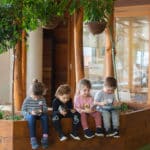We aren’t all superheroes, princesses and firefighters – but sometimes, for a short while, we can be. Fantasy and make-believe games give children a chance to explore these ideas in a safe and comfortable environment, all the while building both their social and cognitive skills.
Social Development
If your child imagines a tea party between Superman and Barbie, they must place themselves in the shoes of both those characters. In order to play as them, your child has to consider, even subconsciously, their feelings, thoughts and behaviours. In this sense, fantasy games involve considering the perspective of other people and acting upon that, which is one of the most important lessons a child could learn.
Group Play
When children attend early learning schools, they may engage in fantasy on a larger scale. They may play games where several people have to act out a specific role and work together to reach a goal. Games like these expand their ability to communicate clearly while listening and responding to other people’s feelings. After all, if the knight doesn’t know how to rescue the princess, the game won’t be much fun at all!
These group interactions are crucial to developing children’s social abilities, and will later come in handy in both school and work environments.
Creativity
Through fantasy games, creativity grows. They are able to act unbridled by the real world because, in these games, anything and everything can happen. These forms of games, as opposed to puzzles and problem-solving, are unlikely to induce any anxiety, stress or judgement, while also letting the child express their views in a healthy manner. One of the most creative aspects of fantasy play is the imaginary friend.
The Imaginary Friend
They are not real and yet there may still be a place for them at the dinner table. Although it can be a bit surprising at the start, don’t worry – imaginary friends are often beneficial for the child.
Support
Imaginary friends tend to support children, giving them a boost of confidence and hope. They help them grow their social skills in a comfortable and accepting way, without having to worry about how real children would react.
Growth
Imaginary friends are a sign of intense creativity as they are essentially an entire other person existing solely in the imagination of a child. The imaginary friend is also a sign that the child is growing emotionally. They may be upset if there isn’t enough room for their friend or if their friend doesn’t get a cup of juice for breakfast too. This shows that they are acknowledging and expanding on other people’s needs and desires, a crucial skill for children to have. If children don’t have imaginary friends, this tends to be developed through playing with other children in childcare centres.
As children grow, imaginary friends tend to disappear. Often, the creativity is placed in another area: painting, writing, sport or music.
Contact Us
The best way for a child to develop is through interaction with other children. Consider enrolling them in one of our two ToBeMe early learning centres, Burwood and Five Dock. If you have any questions about our activities, or if you would be interested in booking a tour, please contact us on (02) 9744 0066 or visit our contact page.
Comments are closed.






